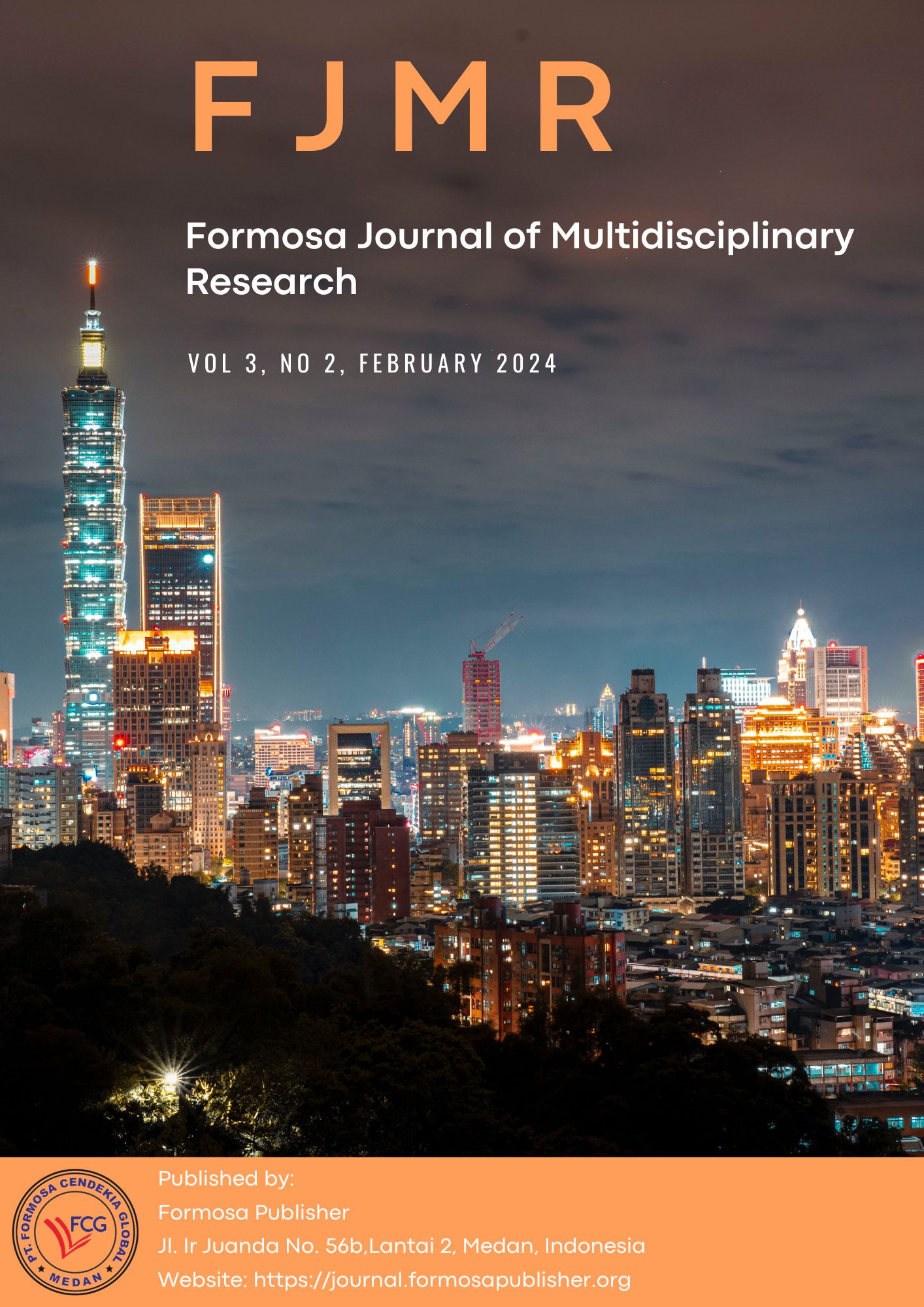Analysis of the Influence of Organizational Culture on Employee Performance Through Job Satisfaction (Study on DP3AKB Pasuruan City)
DOI:
https://doi.org/10.55927/fjmr.v3i2.8237Keywords:
Organizational Culture, Job Satisfaction, Employee PerformanceAbstract
This study used a saturated sampling or census technique to examine job satisfaction as a mediating influence of organizational culture on employee performance at the Office of Women's Empowerment, Child Protection and Family Planning (DP3AKB) in Pasuruan City. Path analysis (Path Analysis) is a data analysis approach. According to the study's findings, employee performance and job satisfaction are positively correlated with organizational culture, with job satisfaction acting as a mediating factor in this relationship. The leadership of Pasuruan City's Office of Women's Empowerment, Child Protection, and Family Planning (DP3AKB) must follow scientific and technological advancements and pay attention to employee satisfaction in order to establish a positive organizational culture and increase employee performance. Workers must be highly driven in order for them to appreciate working with coworkers who support one another in completing tasks and who exhibit high levels of work motivation.Downloads
References
Ahmad, V. Rivai, 2004, Kepemimpinan dan Perilaku Organisasi, Edisi Kedua PT Rajagrafindo Persada, Jakarta.
Aloitabi, Adam.G; 2001. Antecedents of Organizational Citizenship Behavior: A Study of Public Personel in Kuwait; Public Personnel Management, Vol 30, No. 3.
Amstrong. M., 2009, A Handbook of Human Resource Management, Terjemahan. Elex Media Komputindo, Jakarta.
Baan, Y. Ferbya Jurnal Ilmu Administrasi Bisnis, 2015. Pengaruh Budaya Organisasi Terhadap Kinerja Karyawan Pada Hotel Grand Victoria Di Samarinda. Jurnal Ilmu Administrasi Bisnis, Vol.3 No.3, pp. 675- 686
Baron, R and Greenberg, J. 2000. Behavior in Organizations (Understanding and Managing the Human Side of Work). Eight edition, Prentice Hall.
Brahmasari dan Suprayetno. 2008. Pengaruh Motivasi Kerja, Kepemimpinan dan Budaya Organisasi Terhadap Kepuasan Kerja Karyawan serta Dampaknya pada Kinerja Perusahaan (Studi kasus pada PT. Pei Hai International Wiratama Indonesia). Jurnal Manajemen Dan Kewirausahaan, Vol. .10, No. 2, hal. 124-135.
Darsana, M.2013. The Influence of Personality And Organizational Culture on Employee Performance Throught Organizational Citizhenship Behavior. The international journal of management. 2(4), pp:38-63.
Denison, D.R. and Mishra, A.K. 1995, Toward a theory of organizational culture andeffectiveness, Organization Science, Vol. 6 No. 2, pp. 204-23.
Dharma, Agus. 2003. Manajemen Prestasi Kerja: Pendekatan Praktis Para Penyelia Untuk Meningkatkan Prestasi. Rajawali. Jakarta.
Fernandez dan Perry. 2010. Exploring The Link Between Integrated Leadership And Public Sector Performance. The Leadership Quarterly, 21. 308–323
Gistosudarmo, Indriyo dan I Nyoman Sudito. 2000. Perilaku Keorganisasian. BPFE. Yogyakarta.
Handoko, T. Hani, 2003. Manajemen Personalia dan SDM, BPFE, Yogyakarta.
Hasibuan, S.P., Malayu, 2006. Manajemen Sumber Daya Manusia. Bumi Aksara, Jakarta.
Jandeska, Kathryn and Maria L Kraimer, 2005, Womens Perceptions of Organizational Culture, Work Attitudes, and Role Modelling Behaviors, Journal of Managerial Issues, Vol. XVII, Number 4,Winter, 2005
Jayaweera, T. 2015. Impact of Work Environmental Factors on Job Performance, Mediating Role of Work Motivation: A Study of Hotel Sector in England. International Journal of Business and Management, 10(3), 271–278
Judge, T. A., Piccolo, R. F., Podsakoff, N. P., Shaw, J. C., & Rich, B. L. (2010). The Relationship Between Pay and Job Satisfaction: A Meta-Analysis of the Literature. Journal of Vocational Behavior, 77(2), 157–167.
Kahneman, D., & Krueger, A. B. (2006). Developments in the measurement of subjective well-being. Journal of Economic perspectives, 20(1), 3-24.
Koesmono. 2005. Pengaruh Budaya Organisasi Terhadap Motivasi Dan Kepuasan Kerja Serta Kinerja Karyawan Pada Sub Sektor Industri Pengolahan Kayu Skala Menengah Di Jawa Timur. Jurnal Manajemen & Kewirausahaan, Vol. 7, N0. 2,hal. 171-188
Kuranchie-Mensah, E. B., & Amponsah Tawiah, K. 2016. Employee Motivation and Work Performance: A Comparative Study of Mining Companies in Ghana Elizabeth. Journal of Industrial Engineering and Management, 21(1–12), 281–289.
Laschinger, H.K.S., Finegan, J., dan Shamian, J. 2001. The impact of workplace empowerment, organizational trust on staff nurses’s work satisfaction and organizational commitment, Health Care Manage Rev, 26 (3): 7-23.
Luthans, Fred. 2006. Organizational Behavior, Ninth Edition, McGraw Hill, Boston
Mangkunegara, Anwar Prabu. 2009. Evaluasi Kinerja SDM. Refika Aditama. Bandung.
Mangkuprawira, 2007, Manajemen Sumber Daya Manusia Strategik, Penerbit Ghalia Indonesia, Jakarta
Mathis R.L dan Jackson J.H, 2002, Manajemen Sumber daya Manusia, Salemba Empat, Jakarta
Mondy, R. Wayne; Noe, Robert M. 2005. Human Resources Management. International Edition. South Western Publishing: Ohio.
Musriha. 2013. Pengaruh Budaya Organisasi, Pelatihan, Kompensasi dan Motivasi terhadap Kinerja Pegawai di Departemen Perdagangan Kabupaten Probolinggo. Jurnal Ekonomika, Vol 6 No 1 Juni 2013:1-8.
Nasir, 2006. Metodologi Penelitian, Penerbit Ghalia Indonesia, Jakarta.
Nawawi, Hadari. 2003. Kepemimpinan Mengefektifkan Organisasi. Gajah Mada University Press. Yogyakarta.
Nimran, Umar. 2004. Perilaku Organisasi. Citra Media, Surabaya
Downloads
Published
How to Cite
Issue
Section
License
Copyright (c) 2024 Agung Bagus Nugroho, Boge Triatmanto, M.Ch.Sina Setiadi

This work is licensed under a Creative Commons Attribution 4.0 International License.








.png)





















